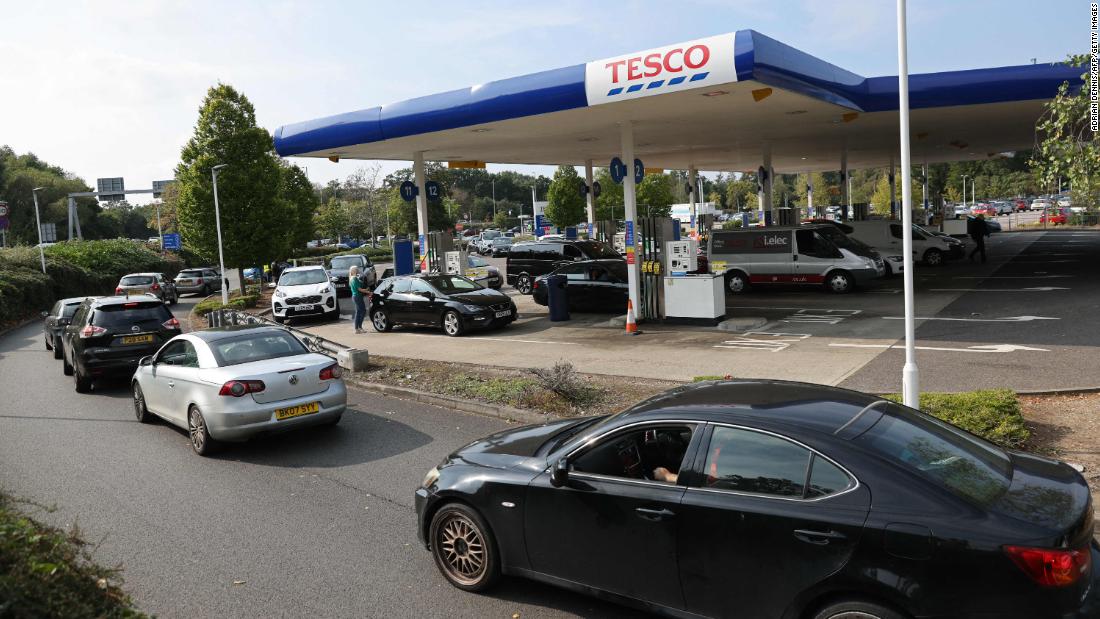UK puts army on standby to deliver fuel as service stations run dry
With thousands of service stations having since run dry, the UK government has announced a series of emergency measures to address the fuel crisis, including issuing temporary work visas for 5,000 foreign truck drivers and suspending competition law to allow suppliers to deliver fuel to rival operators.
The government said Monday that British Army tanker drivers had been “brought to a state of readiness” and could be used to deliver fuel where it is needed most.
“If required, the deployment of military personnel will provide the supply chain with additional capacity as a temporary measure to help ease pressures caused by spikes in localized demand for fuel,” UK Business Secretary Kwasi Kwarteng said in a statement.
Prime Minister Boris Johnson urged the public on Tuesday to fill their tanks “in the normal way, when you really need it.” The situation at service stations is starting to stabilize, he told broadcasters, adding that he sympathized with people who had been affected by shortages.
Panic buying
Social media users have reported long lines at stations across the country, and some motorists on longer trips have been forced to abandon their cars after running out of fuel.
The Petrol Retailers Association, which represents independent fuel suppliers, said in a statement Tuesday that “there are early signs that the crisis at pumps is ending.” The group said that about 37% of the 5,500 service stations operated by its members were out of fuel, compared to as many as two-thirds of stations earlier in the week.
“With regular restocks taking place, this percentage is likely to improve further over the next 24 hours,” the group said.
Yet even as the situation eases, worker shortages are poised to remain a problem in Britain, which has a record 1 million job vacancies. The shortage of truck drivers has been exacerbated by the pandemic and Brexit, which resulted in tens of thousands of EU nationals leaving trucking jobs and other occupations in the United Kingdom.
According to the Road Haulage Association, the United Kingdom is short around 100,000 truck drivers. Last month, the UK government said that “most of the solutions” to the crisis would be driven by industry, and that it did not want to rely on workers from outside the country.
‘Serious damage’
Ruby McGregor-Smith, the president of the British Chambers of Commerce, said the decision by the government to offer 5,000 temporary visas to foreign truck drivers was insufficient, comparing it to “throwing a thimble of water on a bonfire.”
“Without further action, we now face the very real prospect of serious damage to our economic recovery, stifled growth as well as another less than happy Christmas for many businesses and their customers across the country,” she said in a statement.
Johnson signaled Tuesday that additional visas for foreign workers are unlikely.
“What we want to see is an emphasis on high wage, high skill — a high productivity approach to our economy. What I don’t think that people in this country want to do is fix all our problems with uncontrolled immigration,” he said.
Brian Madderson, chair of the Petrol Retailers Association, said that calling in the military alone won’t be enough to resolve the crisis because soldiers may not have the training needed to refill storage tanks at service stations.
“It’s not an absolute panacea,” he told BBC Radio. “There is no one single lever which is going to be pulled by government and industry together which is going to sort this situation.”
BP said in a statement on Sunday that it was seeing “intense demand” and that roughly 30% of the 1,200 sites its supplies across the UK did not have either of the main grades of fuel. The company said it was “working to resupply as rapidly as possible.”
Shell welcomed the government’s action on Monday, saying it’s “been seeing a higher than normal demand across our network which is resulting in some sites running low on some grades. We are replenishing these quickly, usually within 24 hours.”
— Anna Cooban, Chris Liakos and Hanna Ziady contributed reporting.
Correction: An earlier version of this story misstated the number of visas the United Kingdom is offering foreign truck drivers.
![]()


